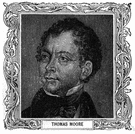Moore
Also found in: Thesaurus, Medical, Encyclopedia, Wikipedia.
Moore
(mo͝or, môr), Clement Clarke 1779-1863. American scholar and poet who wrote the poem "A Visit from St. Nicholas" (1823).
Moore
, George Augustus 1852-1933. Irish writer whose works include poetry, drama, criticism, and novels, such as Esther Waters (1894).
Moore
, George Edward 1873-1958. British philosopher whose theories, presented in Principia Ethica (1903) and other works, influenced 20th-century epistemology and linguistic analysis.
Moore
, Henry 1898-1986. British sculptor whose works, mostly semiabstract human figures, are characterized by smooth organic forms.
Moore
, Marianne Craig 1887-1972. American poet whose works, published in volumes such as Observations (1924) and What Are Years? (1941), are characterized by wit, irony, and unconventional meter.
Moore
, Thomas 1779-1852. Irish romantic poet. Many of his nostalgic and patriotic lyrics, such as "The Minstrel Boy," were set to traditional Irish tunes.
American Heritage® Dictionary of the English Language, Fifth Edition. Copyright © 2016 by Houghton Mifflin Harcourt Publishing Company. Published by Houghton Mifflin Harcourt Publishing Company. All rights reserved.
Moore
(mʊə; mɔː)n
1. (Biography) Bobby. full name Robert Frederick Moore. 1941–93, English footballer, captain of the England team that won the World Cup in 1966
2. (Biography) Dudley (Stuart John). 1935–2002, British actor, comedian, and musician noted for his comedy partnership (1960–73) with Peter Cook and such films as 10 (1979) and Arthur (1981)
3. (Biography) George. 1852–1933, Irish novelist. His works include Esther Waters (1894) and The Brook Kerith (1916)
4. (Biography) G(eorge) E(dward). 1873–1958, British philosopher, noted esp for his Principia Ethica (1903)
5. (Biography) Gerald. 1899–1987, British pianist, noted as an accompanist esp to lieder singers
6. (Biography) Henry. 1898–1986, British sculptor. His works are characterized by monumental organic forms and include the Madonna and Child (1943) at St Matthew's Church, Northampton
7. (Biography) Sir John. 1761–1809, British general; commander of the British army (1808–09) in the Peninsular War: killed at Corunna
8. (Biography) Marianne (Craig). 1887–1972, US poet: her works include Observations (1924) and Selected Poems (1935)
9. (Biography) Thomas. 1779–1852, Irish poet, best known for Irish Melodies (1807–34)
Moore
(ˈmʊʊre)Collins English Dictionary – Complete and Unabridged, 12th Edition 2014 © HarperCollins Publishers 1991, 1994, 1998, 2000, 2003, 2006, 2007, 2009, 2011, 2014
Moore
(mʊər, mɔr, moʊr)n.
1. Archibald Lee (Archie), 1913–98, U.S. boxer.
2. Brian, 1921–99, U.S. novelist, born in Ireland.
3. Clement Clarke, 1779–1863, U.S. scholar and writer.
4. Henry, 1898–1986, English sculptor.
5. Marianne (Craig), 1887–1972, U.S. poet and critic.
6. Thomas, 1779–1852, Irish poet.
Random House Kernerman Webster's College Dictionary, © 2010 K Dictionaries Ltd. Copyright 2005, 1997, 1991 by Random House, Inc. All rights reserved.
ThesaurusAntonymsRelated WordsSynonymsLegend:
Switch to new thesaurus
| Noun | 1. | Moore - United States composer of works noted for their use of the American vernacular (1893-1969) |
| 2. | Moore - English actor and comedian who appeared on television and in films (born in 1935) | |
| 3. | Moore - English philosopher (1873-1958) | |
| 4. |  Moore - Irish poet who wrote nostalgic and patriotic verse (1779-1852) Moore - Irish poet who wrote nostalgic and patriotic verse (1779-1852) | |
| 5. | Moore - United States poet noted for irony and wit (1887-1872) | |
| 6. | Moore - British sculptor whose works are monumental organic forms (1898-1986) |
Based on WordNet 3.0, Farlex clipart collection. © 2003-2012 Princeton University, Farlex Inc.